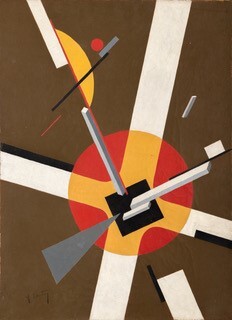A family in court seeking $350 million worth of works by Wassily Kandinsky, and other Russian avant-garde artists also are battling an investor that financed their lawsuits.
The family of the late art collector Uthman Khatib says litigation funder LitFin Capital is refusing to pay legal bills unless it can directly steer the lawsuits. They are accusing LitFin of violating their funding agreement in a private case before a German arbitrator in Frankfurt, according to a person familiar with the matter.
“Funders always try to spend as little as possible and profit as much as possible, but they usually stay within the bounds of ethics and the law,” said Heiko Heppner, a Dentons partner representing the Khatibs. “It became quite apparent that that LitFin was crossing those boundaries.”
The conflict shows how growth in the $16.1 billion litigation finance industry — where investors pay for lawsuits with the hope of cashing in on legal awards — has spurred disputes over who calls the shots in cases. Sysco Corp. in 2023 accused litigation funder Burford Capital of meddling in efforts to settle antitrust suits against poultry processors and meatpackers.
Efforts by litigation funders to steer cases aren’t unprecedented, said Maria Glover, a Carmack Waterhouse professor of law at Georgetown University. But claimants have every right to resist such pushes, she said.
“It seems here that they sought to impose control — they tried the good old-fashioned way through contract, then they tried in kind of a strong-arm way,” said Glover, who is not involved in LitFin matter. It makes sense for the disagreement to be sorted out in arbitration, she said.
LitFin CEO Maros Kravec said in an email that the company doesn’t comment publicly on ongoing proceedings. LitFin is committed to transparency and responsible litigation funding, he said.
“We always defend ourselves vigorously against all unfounded, misleading, and agenda-driven accusations using every legal means available,” Kravec wrote.
Litigation finance critics — which include some insurers and large companies often on the receiving end of suits backed by outside funders — cite concerns that investors are controlling lawsuits as a reason for regulation. Funders steering suits may not be acting in the best interests of the plaintiffs they’re backing, according to opponents like the US Chamber of Commerce.
Laws in some US states, such as Georgia and Louisiana, include provisions that ban funders from asserting control of cases.
Art Fight
The Khatib family’s lawsuits involve approximately 1,800 paintings they allege were stolen from a German storage facility in 2019 by Mozes Frisch, an Israeli businessman. Works by Kandinsky, Kazimir Malevich, and El Lissitzky are part of the haul.
The Khatibs said in court documents that they negotiated the return of half of paintings by Frisch. They sued him in Germany and France, hiring Heppner, when Frisch did not follow through on the agreement.
Frisch’s attorneys in France and Germany, Felix Prozorov-Bastians and Armelle de Coulhac-Mazérieux, did not respond to an email request for comment on the allegations.
LitFin began paying the costs of the Khatib family’s litigation in December 2023 and agreed to fund the litigation for €8.5 million ($9.9 million), according to Castro Khatib, Uthman’s son. LitFin’s return would come from the eventual monetization of the paintings after they were returned, under the terms of the agreement, according to a person familiar with the matter.
The Czech Republic-based LitFin launched in 2018 and focuses on antitrust cases, arbitration, insolvency, and related activities, according to its website. It manages a portfolio exceeding €5 billion ($5.8 billion) in claim value across more than 25 major international disputes, according to Kravec.
The relationship initially flowered. The Khatib family credited LitFin in April 2024, after French police found a large number of the paintings in a raid on an art expert’s storage facility.
“With the help of Dentons and LitFin, we will follow the perpetrators around the world,” they wrote in a press release at the time. “We will continue to recover our property and encourage anyone who considers buying works from the Russian Avantgarde to diligently check its provenance and make sure it is not a stolen piece belonging to our family.”
Souring Relations
LitFin stopped payments in late 2024, after disbursing about €3.7 million ($4.3 million) for the claims, according to Castro Khatib, who says he is in the process of taking over leadership of the case after the death of his father. It also pushed amendments to litigation finance agreement, he said.
LitFin allegedly asked for Castro and his father to be removed from the claim and suggested that the investor would work directly with Dentons lawyers, according to Khatib. LitFin would only pay the €2 million ($2.3 million) in unpaid fees to the law firm if those changes were made to the deal, he claims.
Heppner, the family’s attorney, says LitFin’s Kravec reached out to him and offered to pay off the outstanding invoices to the firm. In return, Kravec allegedly asked Heppner to withdraw from the litigation against Frisch.
“Asking a lawyer to betray his client is unspeakable,” Heppner said. Kravec “was very much intent on controlling the litigation.”
Heppner said Litfin stopped paying attorneys fees and accused the plaintiffs of not sharing a settlement offer that the lawyer claims was already discussed with them.
Uthman Khatib initiated arbitration against LitFin in Germany in February, according to someone familiar with the matter, and died in July. The suit against Frisch and the arbitration with LitFin are paused while Khatib’s estate is being settled. The matter in France is still proceeding.
As for the paintings, about 400 of them are currently being held by the French and German courts. The location of the remaining works of art is unknown.
To contact the reporter on this story:
To contact the editors responsible for this story:



